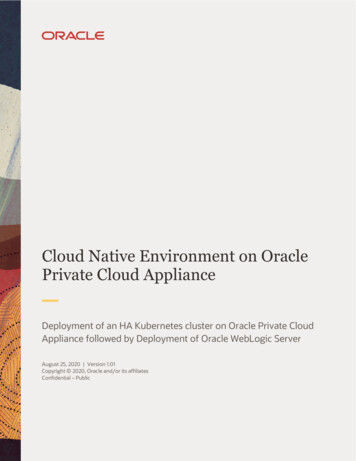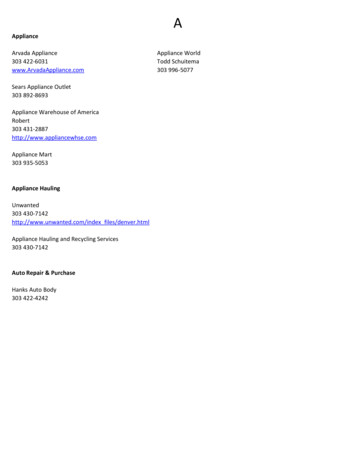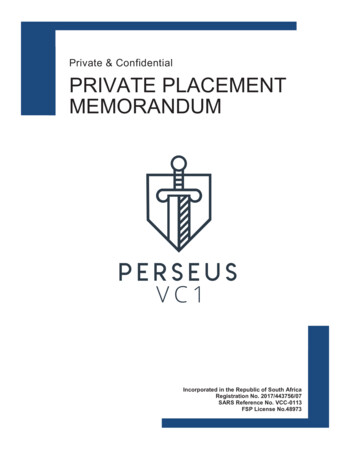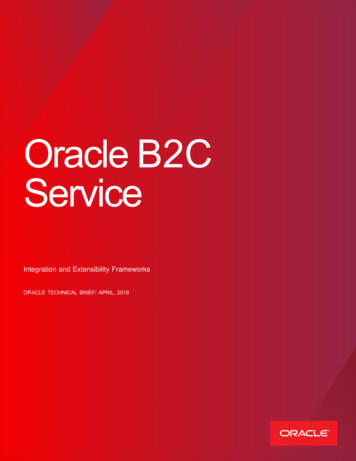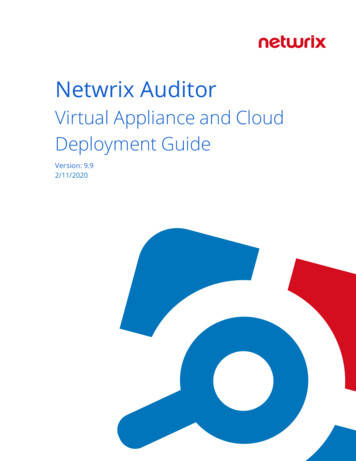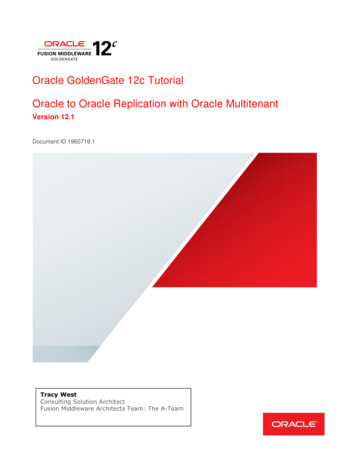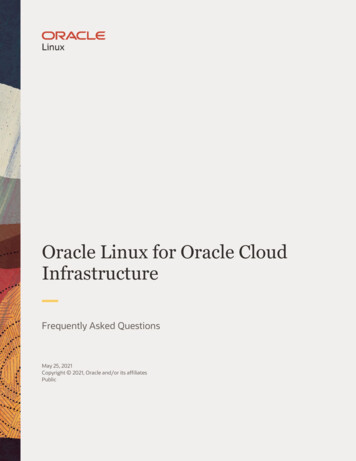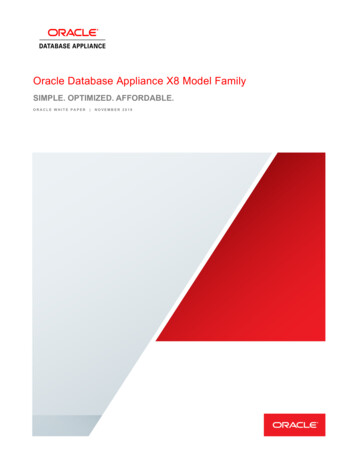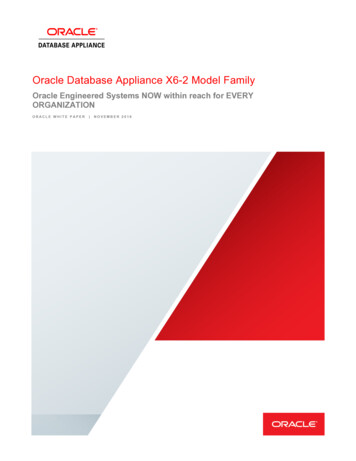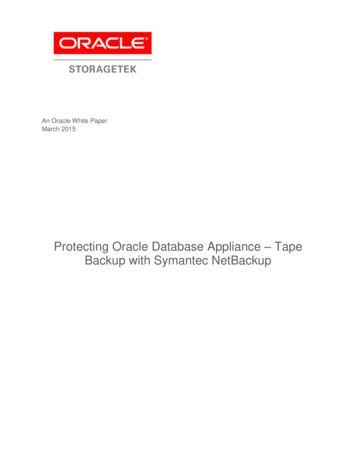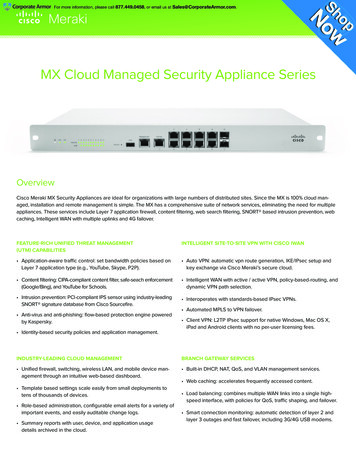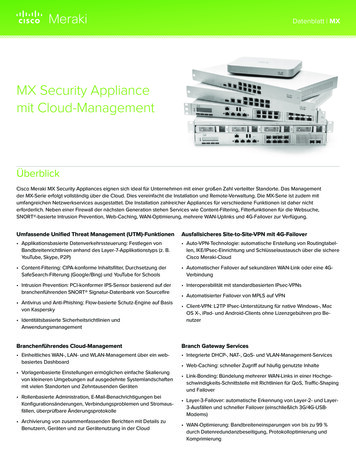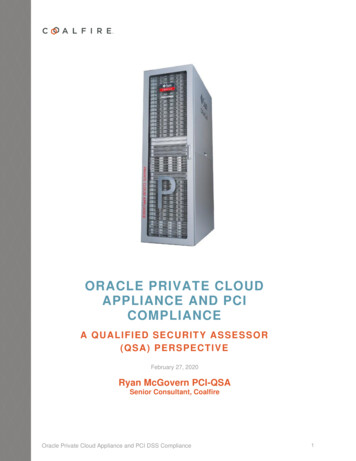
Transcription
ORACLE PRIVATE CLOUDAPPLIANCE AND PCICOMPLIANCEA QUALIFIED SECURIT Y ASSESSOR(QSA) PERSPECT IVEFebruary 27, 2020Ryan McGovern PCI-QSASenior Consultant, CoalfireOracle Private Cloud Appliance and PCI DSS Compliance1
Table of ContentsExecutive Summary . 3Introduction . 3Description . 3Private Cloud Appliance Architecture . 4Hardware Components . 4Software Components . 5Supporting Oracle Technologies . 5The Payment Card Industry Data Security Standards . 5PCI DSS v3.2.1 Detailed Notes . 6Key Definitions . 6Requirement 1: Install and maintain a firewall configuration to protect cardholder data 6Requirement 2: Do not use vendor-supplied defaults for system passwords and othersecurity parameters . 7Requirement 3: Protect stored cardholder data. 9Requirement 4: Encrypt transmission of cardholder data across open, public networks. 9Requirement 5: Protect all systems against malware and regularly update anti-virussoftware or programs .10Requirement 6: Develop and maintain secure systems and applications .11Requirement 7: Restrict access to cardholder data by business need-to-know .11Requirement 8: Identify and authenticate access to system components .12Requirement 9: Restrict physical access to cardholder data .15Requirement 10: Track and monitor all access to network resources and cardholderdata .15Requirement 11: Regularly test security systems and processes .17Requirement 12: Maintain a policy that addresses information security for allpersonnel .18Conclusion .18References .18Acknowledgments .18Oracle Private Cloud Appliance and PCI DSS Compliance2
Executive SummaryOrganizations that process, transmit, or store payment card data are required to comply with the PaymentCard Industry Data Security Standard (PCI DSS) on an ongoing basis. For organizations to meet thesesecurity requirements, they must deploy security measures across all the components of the network andsystems that process, store, or transmit payment card information. Merchants as well as payment cardservice providers are required to attest to compliance with requirements of the PCI DSS annually.IntroductionThe intent of this white paper is to provide information to IT professionals implementing Oracle PrivateCloud Appliance (PCA) within a Cardholder Data Environment (CDE), as well as a Qualified SecurityAssessor (QSA) tasked with assessing them. PCA features and published controls were compared with thePCI DSS 3.2.1 and analyzed for meeting or supporting compliance requirements. The Detailed Notessection reports how these controls meet or support PCI compliance.Requirements that are not relevant for use of the PCA product, features, or controls were omitted from thepublished detailed analysis in the interest of brevity. Furthermore, PCA controls were not independentlytested by Coalfire. The opinions in this whitepaper represent Coalfire’s judgment of documented PCAfeatures and controls, from published information sources supplied by Oracle.DescriptionOracle PCA is an integrated hardware and software system, engineered to enable rapid deployment ofprivate cloud. It delivers a converged infrastructure, complete with compute, networking, virtualization andinternal storage, for hosting mixed applications. PCA supports workloads across multiple platforms, toinclude Linux, UNIX, Oracle Solaris and Microsoft Windows. Automating deployment, scaling andmanagement of application containers in a Oracle Linux Cloud Native Environment is also fully supportedusing Oracle PCA.In combination with customer-provided storage from Oracle or other storage vendors, Oracle PCAincorporates server and network hardware with Oracle operating system, virtualization, and orchestrationsoftware to automate the discovery, configuration, deployment, and management of convergedinfrastructure for hosting virtual machines (VMs).Oracle PCA incorporates high-speed Ethernet or InfiniBand connectivity and Oracle Software DefinedNetworking (SDN) software to provide a converged, wire-once, software-defined networking and storagefabric for all servers and storage in the appliance. Users can leverage the software-defined network fabricto rapidly and dynamically create or modify private or public networks without having to manually re-cableconnections, saving time and reducing the risk of human error. Furthermore, the consolidation of networkconnections results in substantially fewer cables and cards.In addition to rapid infrastructure provisioning, Oracle PCA accelerates complete application stackdeployment through Oracle Virtual Machine (Oracle VM) Templates and Assemblies. These arepreconfigured applications, middleware, and databases packaged as ready-to-run VMs dynamicallyconfigured at deployment time. The result is an unparalleled ability to go from “bare-metal” infrastructurepower-on to logging in to a newly deployed application within days or hours, instead of weeks or months.Oracle Private Cloud Appliance and PCI DSS Compliance3
Private Cloud Appliance ArchitectureThe following diagram (see Figure 1) represents the architecture of Oracle PCA, including internalcomponents and external access points.Customer access to the typical Oracle PCA deployment is provided through an external-facing network andan internal management network. This supports better separation of back-end system administration andoverall network administration duties.Figure 1. Oracle Private Cloud ApplianceSeveral individual hardware and software components make up the complete Oracle PCA engineeredsolution. In addition, there are some supporting technologies that are relevant to PCI DSS compliance inthe Oracle PCA environment. All components described below are in scope for PCI DSS compliance andmust be configured appropriately.Hardware ComponentsOracle PCA is composed of the following featured hardware components as part of the base rack: Two Oracle Server Management Nodes – Oracle Server X8-2 Two – Twenty-Five Oracle Server Compute Nodes – Oracle Server X8-2 Two Leaf/Data Switches - Cisco Nexus 9336C-FX2 Two Spine Switch – Cisco Nexus 9336C-FX2 One Management Switch - Cisco Nexus 9348GC-FXP One Oracle ZFS Storage Appliance – ZS7-2Oracle Private Cloud Appliance and PCI DSS Compliance4
Software ComponentsOracle PCA includes the Oracle VM, Oracle Software Defined Network (Oracle SDN), and Oracle PCAcontroller software components as part of the standard installation.Oracle VM provides an application-driven server virtualization environment that supports scalable and rapidserver, appliance, and application deployment using pre-built templates and assemblies. The Oracle VM isa Type I hypervisor. As with other virtualization technologies, it abstracts basic system services such asprocessing, memory, and I/O management to virtual system instances. The hypervisor enables thisabstraction and ensures that applications cannot directly manipulate the system resources and thus limitstheir ability to adversely affect those resources and other applications.Oracle VM provides the primary management interface for managing guest operating systems andapplications. However, once the Oracle PCA is in place, it is generally accessed indirectly through theOracle VM Manager or through Oracle Enterprise Manager which can be installed separately.Oracle SDN supports dynamic connection of virtual servers to networks and storage using virtual networkinterface cards (vNICs).Oracle PCA controller software orchestrates and supports the management of hardware components andvirtual resources, software upgrades, and monitoring of system utilization metrics.Supporting Oracle TechnologiesWhile there are several products that are either integrated into the Oracle PCA or can be utilized to facilitatecompliance with the PCI DSS requirements, the key supporting technology is the Oracle EnterpriseManager.Oracle Enterprise Manager is Oracle’s integrated enterprise IT management product, which provides acomplete, integrated and business-driven enterprise cloud management solution. By adding OracleEnterprise Manager to the Oracle PCA deployment, customers can quickly build and manage a PrivateCloud within the data center and offer services like Infrastructure as a Service (IaaS) and Database as aService (DBaaS). Oracle Enterprise Manager enables business users, developers, and testers rapid andself-service access to cloud services while allowing administrators to govern the cloud services. Both selfservice users and administrators can access usage data and create chargeback reports to assess theservice consumption.The Payment Card Industry Data Security StandardsThe PCI DSS is a framework of information security requirements that enforce the minimal set of informationsecurity controls necessary to protect an environment of computer systems that process, store, or transmitcardholder data.Any organization that processes, stores, or transmits cardholder data (payment card data) must complywith the PCI DSS and must attest to their compliance annually. Currently, organizations are required tocomply with the PCI DSS version 3.2.1 as of June 2018.The PCI DSS framework is composed of twelve requirements and each requirement has multiple subrequirements (controls) that provide a detailed description of the control as well as its verificationprocedures. The PCI DSS requires that organizations define their cardholder data environment (CDE) andthat the requirements of the PCI DSS be assessed against the organization’s cardholder data environment.Oracle Private Cloud Appliance and PCI DSS Compliance5
PCI DSS v3.2.1 DET AIL ED NOTESKey DefinitionsMeets PCI: Oracle PCA is equipped with capabilities which allow it to meet the intent of the PCI DSSrequirement without user configuration or after initial setup.Supports PCI: Oracle PCA is equipped with capabilities which allow it to support compliance with the PCIDSS requirement. This includes user-required configuration, customer processes, or customerdocumentation where a shared responsibility model is leveraged for meeting PCI DSS requirements.Requirement 1: Install and maintain a firewall configuration to protectcardholder dataFirewalls are devices that control computer traffic allowed between an entity’s networks (internal) anduntrusted networks (external), as well as traffic into and out of more sensitive areas within an entity’s internaltrusted networks. The cardholder data environment is an example of a more sensitive area within an entity’strusted network.The Oracle PCA must be deployed within a PCI DSS compliant environment, and thus this requirement willnot generally apply directly to the appliance. Typically, compliance with this requirement is met by placingappliances such as the Oracle PCA behind a firewall(s) deployed elsewhere in the infrastructure.However, there may be situations in which segmentation is created within the appliance to: Reduce the cardholder data environment scope Segment public-facing systems and internal systems Segment testing, development, and production environmentsFor those situations in which segmentation is used, the ability of the Oracle PCA to both support virtualmachines configured as firewalls and to create separate physical networks through the dedication ofnetwork ports facilitates compliance with Requirement 1. It is important to note that the validity of anysegmentation must be validated by technical review and penetration testing in order to meet PCI DSScompliance.PCI RequirementComment/ExplanationMeets/Supports PCI1.1.4 Requirements for a firewall ateach Internet connection andbetween any demilitarized zone(DMZ) and the internal networkzone.Firewalls running as virtual machines onthe compute nodes can be configuredwithin the Oracle PCA environment toperform firewall functions. The OraclePCA Private Virtual Interconnects (PVI)fabrics can also be used to provideprivate networks that do not leave theOracle PCA rack.SupportsOracle Private Cloud Appliance and PCI DSS Compliance6
1.1.6 Documentation of businessjustification and approval for use ofall services, protocols, and portsallowed, including documentation ofsecurity features implemented forthose protocols considered to beinsecureServices, protocols, and ports usedwithin the Oracle PCA to support internalfunctions meet this requirement.1.3.6 Place system componentsthat store cardholder data (such asa database) in an internal networkzone, segregated from the DMZand other untrusted networks.Individual network zones can be createdwithin the Oracle PCA, segregated withvirtual firewalls, to facilitate compliancewith this requirement.Supports and/orMeetsServices, protocols, and ports used forhosted VMs are out of scope for theOracle PCA.SupportsRequirement 2: Do not use vendor-supplied defaults for systempasswords and other security parametersMalicious individuals (external and internal to an entity) often use vendor default passwords and othervendor default settings to compromise systems. These passwords and settings are well known by hackercommunities and are easily determined via public information.Oracle PCA facilitates changing default accounts and credentials at system implementation by virtualmachine templates and Enterprise Manager. Virtual machine templates can be built to mirror industryaccepted hardening standards and reduce/eliminate errors caused by manual component configurations.Any administrative access to the Oracle PCA is through SSH or SSL encrypted channels.PCI RequirementComment/ExplanationMeets/SupportsPCI2.1 Always change vendor-supplieddefaults and remove or disableunnecessary default accounts beforeinstalling a system on the network.All accounts required for administrationof the Oracle PCA can be configured tosupport this requirement.Supportsand/or MeetsThis applies to ALL default passwords,including but not limited to those used byoperating systems, software thatprovides security services, applicationand system accounts, POS terminals,payment applications, Simple NetworkManagement Protocol (SNMP)community strings, etc.2.2 Develop configuration standards forall system components. Assure thatthese standards address all knownsecurity vulnerabilities and areconsistent with industry-acceptedsystem hardening standards.In addition, utilization of OracleEnterprise Manager can supportcentralized management of vendor andinternal accounts.Virtual machines can be created usingsecure guidance from applicablestandards then saved as templates.These templates can then be deployedfor all future device needs, saving timeand minimizing human error, thusOracle Private Cloud Appliance and PCI DSS ComplianceSupports7
Sources of industry-accepted systemhardening standards may include, butare not limited to: Center for Internet Security (CIS) International Organization forStandardization (ISO) SysAdmin Audit Network Security(SANS) Institute National Institute of StandardsTechnology (NIST)2.2.1 Implement only one primaryfunction per server to prevent functionsthat require different security levels fromco-existing on the same server. (Forexample, web servers, databaseservers, and DNS should beimplemented on separate servers.)facilitating compliance with thisrequirement.Oracle PCA supports the implementationof one primary function per virtual server.In addition, Oracle PCA facilitates morecost and resource effective separation ofsystems, as resources can be shiftedbetween virtual machines within thelarger system.Supportsand/or MeetsOnly those services and protocolsnecessary for management of the OraclePCA environment are enabled by default.Supportsand/or MeetsNote: Where virtualization technologiesare in use, implement only one primaryfunction per virtual system component.2.2.2 Enable only necessary services,protocols, daemons, etc., as required forthe function of the system.Management of services and protocolson virtual machines is outside of thescope of the Oracle PCA complianceenvironment, but the use of securetemplates can facilitate more securevirtual machine deployments.2.2.3 Implement additional securityfeatures for any required services,protocols, or daemons that areconsidered to be insecureNote: Where SSL/early TLS is used, therequirements in Appendix A2 must becompleted2.2.4 Configure system securityparameters to prevent misuse.2.3 Encrypt all non-consoleadministrative access using strongcryptography.While the management of additionalsecurity features and system securityparameters on deployed virtual machinesis out of scope for the Oracle PCAcompliance environment, theimplementation of additional securityfeatures in place for virtual machines canbe facilitated by the development ofsecure machine templates.SupportsAdministrative access to the Oracle PCAis conducted through SSH and TLSencrypted channels.MeetsOracle Private Cloud Appliance and PCI DSS ComplianceSupports8
Note: Where SSL/early TLS is used, therequirements in Appendix A2 must becompleted.2.4 Examine system inventory to verifythat a list of hardware and softwarecomponents is maintained and includesa description of the componentsfunction/use.Oracle Enterprise Manager supports thisrequirement when used to manageaccess to the Oracle PCA managementinfrastructure.SupportsRequirement 3: Protect stored cardholder dataProtection methods such as encryption, truncation, masking, and hashing are critical components ofcardholder data protection. If an intruder circumvents other security controls and gains access to encrypteddata, without the proper cryptographic keys, the data is unreadable and unusable to that person. Othereffective methods of protecting stored data should also be considered as potential risk mitigationopportunities. For example, methods for minimizing risk include not storing cardholder data unlessabsolutely necessary, truncating cardholder data if full PAN is not needed, and not sending unprotectedPANs using
comply with the PCI DSS version 3.2.1 as of June 2018. The PCI DSS framework is composed of twelve requirements and each requirement has multiple sub- requirements (controls) that provide a detail
